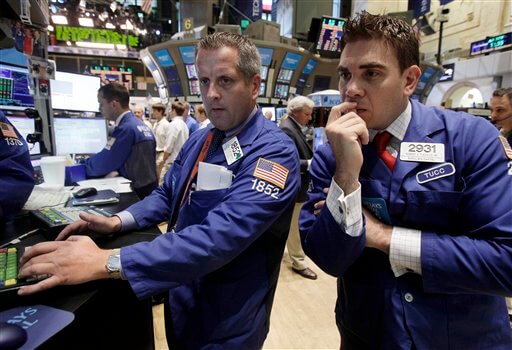
Bargain hunters helped push the Dow back above 11,000 Tuesday.
The Dow Jones industrial average rose 196 points, or 1.8 percent, to 11,005 in midday trading. On Monday, the Dow had its worst day since 2008, plunging 634.76 points as fear coursed through global markets.
“We’ve got no information that makes us feel any better or worse” than Monday, but some investors pounced because they believed there were good values to be found in stocks, said Peter Coleman, head of equity research at investment bank JMP Securities. “This is a relief rally.”
Other investors said stocks were cheap before the declines of the last two weeks and argue that they’ve become cheaper still. “As a long-term investor, that’s what I like to see,” said Brian Jacobsen, chief portfolio strategist for Wells Fargo Funds Management, which has $228 billion in assets under management. While stocks were plummeting Monday afternoon, Jacobsen said he was buying technology stocks, particularly those with healthy balance sheets.
Industries that fell the hardest on Monday were up the most early Tuesday. Financial stocks in the S&P 500 rose 4.9 percent after a 10 percent decline on Monday.
Traders were also looking ahead to Tuesday afternoon, when the Federal Reserve will issue a policy statement about interest rates and any monetary actions the central bank might be planning. The Fed’s key interest rate has been held at close to zero since 2008. The Fed in June ended a $600 billion program to buy Treasurys as a way to support the economy. Some Fed officials oppose another round of so-called quantitative easing because it could lead to higher inflation.
“Prior to the recent turmoil, we had thought the Fed would stand pat” at its policy meeting, said Paul Dales, senior U.S. economist with Capital Economics. “But now some action seems likely.”
When the central bank issues its statement this afternoon, many economists don’t expect to see another round of Treasury purchases. But Dales said the Fed could pledge to hold onto the Treasurys and other assets it has already bought for “an extended period.” Such a move could soothe investors temporarily because it means the Fed won’t flood the market with assets to sell. But it likely wouldn’t be a significant boost to the economy.
The S&P 500 index rose 24, or 2.2 percent, to 1,144. The Nasdsaq composite index rose 59, or 2.5 percent, to 2,416.
Gold set another record early Tuesday. It rose $26.90 ounce to $1,740.10. Gold started the year at $1,421.40. Investors often run to gold when they’re looking for something safe. They also buy gold when they’re worried about inflation, which could be a result if the Federal Reserve were to announce new stimulus.
Investors piled into Treasurys on Monday, sending the yield on the 10-year note down to 2.34 percent. A bond’s yield falls when its price rises.
That matched its lowest level for the year, reached last week. Treasurys gave back some of those gains Tuesday, “as they shake off some of the froth,” RBS Securities analysts wrote in a report. The 10-year yield rose to 2.39 percent.
Investors have been worried about the first-ever downgrade to the U.S. credit rating by Standard & Poor’s, the slowing U.S. economy, debt problems in Europe and rising inflation in less-developed countries.
Economists believe there is a greater chance of a U.S. recession because the economy grew much more slowly in the first half of 2011 than previously thought. The economy grew at its slowest pace in the first half of 2011 since the recession ended in June 2009.
The manufacturing and services industries barely grew in July. The unemployment rate remains above 9 percent, despite 154,000 jobs added in the private sector in July.
Economies across the globe are also struggling.
Worries are growing that Spain or Italy could become the next European country to be unable to repay its debt. The European Central Bank bought billions of euros of Italian and Spanish bonds Monday in hopes of lowering borrowing costs for the countries.
Another concern: high inflation in less-developed countries, which have been the world’s main economic engine through the recovery. China’s inflation rose to a 37-month high in July. Hong Kong’s Hang Seng index fell 5.7 percent on Tuesday.
The worries about the global economy falling into a second recession have pulled attention away from stronger corporate earnings.
Dish Network Corp.’s second-quarter net income rose 30 percent to $334.8 million on stronger revenue. Internet company AOL Inc. reported a smaller net loss for its second quarter, helped in part by stronger advertising revenue.
The housing market, though, remains weak. Homebuilder Beazer Homes USA Inc. said its loss widened last quarter after it closed on fewer homes.
Among the 441 companies in the S&P 500 index that have already reported their second-quarter earnings, profits are up 12 percent from a year ago.


































